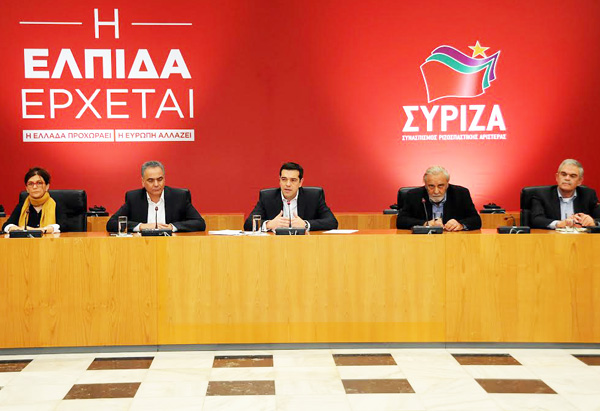Greece’s radical left ruling party, Syriza, has linked ending austerity to beating the rise of fascism in the country after a Council of Europe report said that the country had ‘no comprehensive strategy’ for tackling increasing levels of racism.
The strongly critical report, published yesterday by the Council of Europe’s Commission Against Racism and Intolerance (ECRI), said that Greece had seen “a strong increase in the levels of incitement to racial hatred, in particular in the context of public discourse, including from representatives of political parties”. Measures taken to address a surge in racist violence in recent years have been “largely insufficient”, and there is “widespread impunity for acts of hate speech and insufficient official condemnation”.
In recent years, Greece has seen the rise of neo-fascist party Golden Dawn, which came third in the country’s recent elections, winning 6.3% of the vote. All of Golden Dawn’s 18 MPs who served in the previous parliament are set to go on trial soon – although a date has not been set – charged with belonging to a criminal group. The crackdown on the organisation followed the murder of an anti-fascist rapper in 2013, along with accusations that members were involved in the murder of a Pakistani immigrant and the beating of political opponents.
Dimosthenis Papadatos, the coordinator of the Human Rights Department of Syriza says his party has been trying for years to tackle the issues highlighted in the ECRI report, and highlighted ending austerity as a key step to getting rid of fascism. He says they approach the problem in four ways: through working with antifascist movements, using parliamentary control, working with the Council of Europe and by addressing issues such as poverty and disillusionment with politics which he says fuels racist propaganda.
Papadatos acknowledges that neo-Nazism had spread to state apparatus including the police, church, justice system and to a lesser extent army, and says that the trial of the former Golden Dawn MPs would be the start of a “radical cleansing” of Greek society.
“But we know that fascism is also a social phenomenon,” he adds, “we cannot finish with it if we do not finish with austerity, political cynicism, antisemitism and islamophobia. So, the trial is a necessary start – not the end of the road.”
Greece has been locked in negotiations with Eurozone finance ministers over a bailout extension, which they secured yesterday. Syriza was elected on an anti-austerity platform, promising to roll back the economic reforms imposed on the country by the ‘troika’ of lenders – the EU, IMF and European Central Bank.
Papadatos also says that the ministers of Public Order and Migration Policy have said controversial detention centres – described by United Nations as holding illegal immigrants in “shocking conditions” and seen as designed to appeal to right-wing voters – will be shut down in 100 days, with 20 or 30 immigrants released every day.
Syriza didn’t win an outright majority in the Greek parliament, forming a coalition with the nationalist far-right Independent Greeks party, a move that Dr Daphne Halikiopoulou, a lecturer in comparative politics at the University of Reading in the UK and co-author of The Golden Dawn’s Nationalist Solution: Explaining the Rise of the Far Right in Greece says is worrying.
“Syriza got into coalition with a far-right party. That’s worrying. It said the anti-austerity line was more important than the social reform line.”
Dr Halikiopoulou says the ECRI report is “not at all surprising”. “There is widespread far-right nationalism and racism,” she says, “and this is reflected in the vote for Golden Dawn. These votes for Golden Dawn legitimise that, making the views seem quite mainstream.”
“It’s interesting that a party whose leading members are all indicted for crimes like murder were the third party in parliament. They marginally lost support from 2012. They may be banned, but banning does nothing because they will just change the name.”
A historic lack of a government strategy for helping immigrants and asylum seekers to integrate or move into the EU gave far-right groups like Golden Dawn space in which to flourish, according to Eva Cosse from Human Rights Watch.
“We have heard many stories of Greek citizens who instead of calling the police called Golden Dawn to escort immigrants out of the neighbourhoods.”
In the short term Cosse believes Greece must strengthen criminal law on racist violence and “prosecute as strongly as possible to send a message”. In the long term “it will take a lot of effort through education and campaigns and also a clear strategy” to deal with the problems, she adds.



















